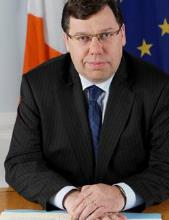Brian Cowen 2008 - 2011:
Brian Cowen officially became leader of Fianna Fáil and Taoiseach in May 2008. He was first elected as a TD in 1984.
Brian Cowen was appointed as Tánaiste and re-appointed as Minister for Finance on 14th June, 2007 having first been appointed Minister for Finance in September 2004. He has served as Minister for Foreign Affairs from January 2000 to September 2004; Minister for Health and Children from June 1997 to January 2000; Minister for Transport, Energy and Communications from January 1993 to December 1994, and Minister for Labour from February 1992 to January 1993. Since 1992 when first appointed to a Ministry, Brian Cowen has developed and honed his managerial competence, leadership skills and effective decision making and judgement in various Departments.
As Minister for Transport, Energy and Communications Brian Cowen opened up competition in the energy market, worked with
Former Party Leaders & Taoisigh:

Aer Lingus on the Cahill plan and initiated the reorganisation of Telecom Eireann to prepare for competition in the sector. As Minister for Health, following consultation with advocacy groups, he introduced the ‘Cowen package' for people with an intellectual disability which he subsequently augmented with more resources as Finance minister in his first budget.
While Minister for Foreign Affairs Brian Cowen successfully steered Ireland's campaign for a seat on the UN Security Council for the two year period 2001-2002. He chaired the Council during the month after 9/11 at a very critical and sensitive time when key decisions were needed in response to the increased international terrorist threat. In fact on that very day in September 2001, in the immediate aftermath of the attacks on the Twin Towers, he held a meeting with the then PLO leader, Yasser Arafat, at which he managed to convince him to make an early statement condemning the attacks thereby defusing the immediate tension and anxiety raised in the Middle East.
Brian Cowen chaired the successful negotiations with Foreign Ministers on the majority of the EU Constitutional Treaty issues during Ireland's Presidency of the EU in 2004. As chair of the Foreign Affairs Council he also oversaw the preparations for the largest enlargement ever of the EU with 10 new states joining the Union during our Presidency.
His judgement and negotiating skills were used effectively in the critical Northern Ireland talks in Hillsborough, London and Dublin with the British Government and parties in the North. He was particularly involved in ensuring the implementation of the Patten Report on policing which was a key confidence building measure for the catholic community in Northern Ireland.
As Minister for Finance Brian Cowen's focus was on keeping minimum wage earners out of the tax net while ensuring that those on the average industrial wage were kept out of the higher tax bracket. Significantly, he was the first Minister for Finance to ensure that the tax incentives used by the well off to limit their tax liability would be subject to a cap.
He has also introduced important reforms to the budgetary process including the move to a Unified Budget, bringing greater clarity to what level of increased funding is intended for existing services and that required to introduce new service developments.
Brian Cowen produced the most ambitious development programme that this country had ever seen - the National Development Plan - a major capital investment programme to lay the foundations for the future economic and social development of the State.
